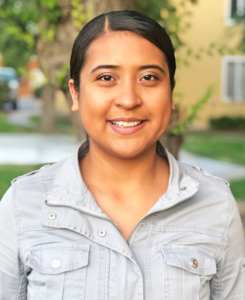Recently we spoke with Anavelen Macias, 4th grade teacher and Partnership Team Lead at Grape Street Elementary School, to learn more about how she prepares her students for success. Here’s what she shared:

Photo: Dedicated Grape Street teacher Anavelen Macias has high expectations for her students.
Why did you want to pilot the Eureka Math curriculum in your classroom and what do you like about it?
When Eureka Math — a new curriculum that connects math to the real world — was introduced to us, I was a new teacher at Grape Street and I knew the curriculum was required for the school in the following year. So I decided to pilot the curriculum my first year, which means I was the only 4th grade teacher to try it out for full implementation. It was a learning experience, but what I really liked about it is that it is all about conceptual growth; more understanding than just procedures. I like that it allows students to draw models, and it exposes them to different ways of doing math. I was happy that my students went into 5th grade prepared to utilize the curriculum since they were already exposed to it.
You are implementing customized classroom strategies for Guided Reading for your fourth grade students. Why is this important?
Classroom strategies are important for students’ individual progress and growth. For example, I’ve implemented guided reading in my classroom as a way for students to deepen their individual reading comprehension. Each week, my students gather in small groups to practice reading strategies and standards using texts based on their independent reading level. This setup not only allows for reading mastery, but also leadership opportunities. A student is assigned as team captain per group, and each team captain brings their group together.
How do you cultivate a positive classroom culture that supports strong outcomes?
I like to be very direct about my expectations for students. We establish classroom rules together using the school’s values — be safe, responsible and respectful. I engage my students in collective decision making because it empowers them to speak up and be leaders in our classroom and in school. I also value the importance of restorative circles. These are open, judgment-free spaces where students build community and show empathy for one another. This allows them to trust each other and I’ve even seen them speak up for their classmates and other students in school.
How do you use data to drive your instruction?
I use the ELA and Math Interim Assessment Blocks (IABs) to check in with my students and see where they are in terms of their academic progress. These practice tests expose my students to similar SBAC items they may encounter when they take the summative exam. The IABs help me to identify where improvement is needed in terms of standards, item types, and strategies.
How has the Partnership supported you at your school?
A lot! Myeisha Phillips, Senior Coordinator of School Transformation (Math) and Nychelle Toussaint, Coordinator of School Transformation (English) have held multiple professional development (PD) sessions with us, and have individualized PDs by grade level, too. They also offer coaching, feedback, suggestions, and ideas. Nychelle has observed and recorded my lessons, which have served as a best-practice tool for guided reading. Myeisha modeled a Eureka math lesson using my classroom and invited 4th grade teachers from the Partnership network to attend. I don’t think I could do all my work without their support.
What has been your experience as Partnership Team Lead?
I’m part of the Instructional Leadership Team (ILT) at Grape Street as a Team Lead. Being a Team Lead means that I am able to review our schools’ overall goals, and lead curriculum to stay on track with planning and successful execution of these goals. I also have found the Team Lead Seminars very helpful and supportive to my teaching and leadership skills. I always walk away with great information and better ways to lead social-emotional work in the classroom. The seminars serve as good reminders that our students have many external factors that can hinder their academic performance. It is up to us to learn more and do our best to help students refocus their attention to the classroom.
